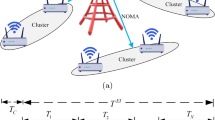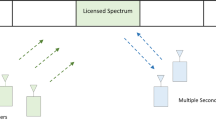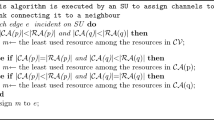Abstract
In Cognitive Radio Network (CRN), as maximizing the throughput may increase the energy consumption, the spectrum sensing policy should balance the energy and throughput. So as to reserve the special right of the Primary User (PU), the secondary user (SU) is confronted with the tasks of the time to perceive a channel, how long would the sensing operation take, the time to shift from the channel and the time to transfer through an assigned channel. Hence in this paper, a joint power control and adaptive sleeping policy (JPCASP) is proposed for CRN. In this method, the maximum admissible transmit power is estimated from the signal to noise ratio values measured at the PU. Using the energy detection method with double bounds, a Local Decision Rule at each SU is gathered and checked. Finally, adaptive threshold regulation technique based on the estimated throughput is applied. Experimental results show that the proposed JPCASP has higher delivery ratio with reduced delay and energy consumption.









Similar content being viewed by others
Data Availability
The authors didn’t use any third party data in their research paper.
References
Yao, C., Wu, Q., & Zhou, L. (2014). Traffic based optimization of spectrum sensing in cognitive radio networks. Hindawi Publishing Corporation, Mathematical Problems in Engineering, 2014, 349350.
Lee, H. S., Ahmed, M. E., & Kim, D. I. (2018) Traffic-aware optimal spectrum sensing policy in wireless-powered cognitive radio networks, In: Proceedings of Še 12th International Conference on Ubiquitous Information Management and Communication, Langkawi, Malaysia, J 5–7, 2018 (IMCOM ‘18), pp 7.
Jin, Z., Qiao, Y., Liu, A., & Zhang, L. (2018). EESS: an energy-efficient spectrum sensing method by optimizing spectrum sensing node in cognitive radio sensor networks. Hindawi, Wireless Communications and Mobile Computing, 2018, 9469106.
Durowoju, O., Arshad, K., & Moessner, K. (2012). Distributed power control algorithm for cognitive radios with primary protection via spectrum sensing under user mobility. Elsevier, Ad Hoc Networks, 10(2012), 740–751.
Gao, Y., Deng, Z., Choi, D., & Choi, C. (2017). Combined pre-detection and sleeping for energy-efficient spectrum sensing in cognitive radio network. Journal of Parallel Distributed Computing, 114, 85–94.
Zhang, F., Jing, T., Huo, Y., & Ma, L. (2018), Optimal spectrum sensing-access policy in energy harvesting cognitive radio sensor networks., In: Elsevier, 2017 International Conference on Identification, Information and Knowledge in the Internet of Things.
Shah, H. A., & Koo, I. (2018). Reliable machine learning based spectrum sensing in cognitive radio networks. Hindawi, Wireless Communications and Mobile Computing, 2018, 5906097.
Ramchandran, M., & Ganesh, E. N. (2020). Energy efficient and interference-aware spectrum sensing technique for improving the throughput in cognitive radio networks. IOP Conference Series: Materials Science and Engineering, 993, 012092.
Develi, I. (2020). Spectrum sensing in cognitive radio networks: threshold optimization and analysis. Wireless Com Network., 1, 1–9.
Ramchandran, M., & Ganesh, E. N. (2021). MBSO algorithm for handling energy-throughput trade-off in cognitive radio networks. The Computer Journal, 65(7), 1717–1725.
Liu, X., Lu, W., Ye, L., Li, F., & Zou, D. (2017). Joint resource allocation of spectrum sensing and energy harvesting in an energy-harvesting-based cognitive sensor network. Sensors, 17(3), 600. https://doi.org/10.3390/s17030600
Li, Z., Liu, B., Si, J., & Zhou, F. (2017). Optimal spectrum sensing interval in energy-harvesting cognitive radio networks. IEEE Transactions on Cognitive Communications and Networking, 3(2), 190–200.
Gulzar, W., Waqas, A., Dilpazir, H., Khan, A., Alam, A., & Mahmood, H. (2022). Power control for cognitive radio networks: a game theoretic approach. Wireless Personal Communications, 123, 745–759. https://doi.org/10.1007/s11277-021-09156-x
Lee, K. (2021). Low-complexity transmit power control for secure communications in wireless- powered cognitive radio networks. Sensors, 21, 7837. https://doi.org/10.3390/s21237837
Wang, Z., Xiao, W., Wan, X., & Fan, Z. (2019). Price-Based Power Control Algorithm in Cognitive Radio Networks via Branch and Bound. IEICE Transaction of Information & Systems, 102(3), 505–511.
Author information
Authors and Affiliations
Corresponding author
Ethics declarations
Conflict of Interest
The authors don’t have any conflict of Interest.
Additional information
Publisher's Note
Springer Nature remains neutral with regard to jurisdictional claims in published maps and institutional affiliations.
Rights and permissions
Springer Nature or its licensor (e.g. a society or other partner) holds exclusive rights to this article under a publishing agreement with the author(s) or other rightsholder(s); author self-archiving of the accepted manuscript version of this article is solely governed by the terms of such publishing agreement and applicable law.
About this article
Cite this article
Indumathi, G., Vaithianathan, V. Joint Power Control and Adaptive Sleeping Policy for Cooperative Spectrum Sensing in CRN. Wireless Pers Commun 133, 1–13 (2023). https://doi.org/10.1007/s11277-023-10656-1
Accepted:
Published:
Issue Date:
DOI: https://doi.org/10.1007/s11277-023-10656-1




